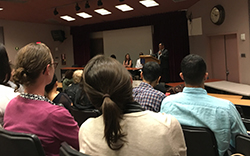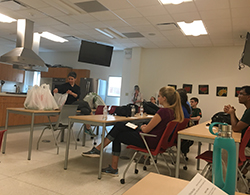 I am working at the Rodham Institute in Washington, D.C. for my Pinhead Internship.
I am working at the Rodham Institute in Washington, D.C. for my Pinhead Internship.
The Rodham Institute was founded in 2013 and serves to help underserved areas in Washington, D.C. by working to achieve health equity throughout the D.C. area. This week I worked largely with Ms. Tracie Bass, executive Program Coordinator, Ms. Sara Mutnick, Project Manager, and Dr Jehan El-Bayoumi MD, FACP, Executive Director.
From the very first minute I walked into the Rodham Institute, I was learning about social determinants of health, which are so central to what the Rodham Institute does. The social determinants of health describe how the environment we live in, and interact with daily, determines our health. I was involved in a couple projects this week and got the chance to shadow two superb resident doctors.
On Tuesday, I had the opportunity to visit the Capital Area Food Bank and learn about urban gardening and eating healthy. After we finished gardening and cooking, we could participate in a lesson on food insecurity and what that looks like to the person facing it. I learned about the nuances of how the faults of American social programs and social factors in the community in which one is living can culminate to create an impecunious environment that cannot be easily escaped.
On Wednesday and Thursday I was fortunate to shadow two resident doctors working at George Washington University Hospital in the outpatient clinic. On Wednesday, I worked with an inspiringly passionate doctor named David who had devoted relationships with each of his patients, and genuinely cared about each of his patients.
On Thursday, I worked with an outgoing and friendly resident doctor, Lauren, who was so patient and kind with all her patients. On Monday, Wednesday afternoon, Thursday afternoon, and Friday I was helping the Rodham Institute with their See the City You Serve project which works to show upcoming interns at George Washington University the situations in which a portion of their patients come from to build an understanding relationship between the doctor and the patient, which will in turn increase health equity throughout DC. See the City You Serve is an opportunity unique to GW, arranged by the Rodham Institute, and is certainly an innovative step towards reaching the goal of good health for all.
On Friday, the tour to United Medical Center, the sole hospital that works with residents of the more destitute South East side of DC, took students on a guided bus tour through the impoverished wards 7 and 8 , and pointed out the lack of access to fresh groceries and abundant corner stores and liquor stores that plagued the area.
When we arrived at the United Medical Center we listened to distinguished panel members discuss the lack of health opportunities present in the area, and how the upcoming doctors could work with their patients in a more understanding way provided the patients circumstances.
of health opportunities present in the area, and how the upcoming doctors could work with their patients in a more understanding way provided the patients circumstances.
This week I enjoyed learning about a city that differs greatly from the rural area that I am from, and about the problems that persist in such an environment. I also greatly enjoyed learning about ways in which we can help alleviate these problems to create health equity in urban areas.

This is truly an excellent learning experience! You seem to be working with some outstanding project directors and doctors! Have a great time and soak it all in, Beth!
Love, Aunt Denise
Bravo Beth! This looks like a fascinating experience. I am excited for you!
What an amazing week! Thanks for the report. There are so many people who need help out there. Thank you, Beth, for bringing a new voice to our social responsibility.
Do you know how certain populations and ethnic groups’ access to fresh food and vegetables affects their propensity to hereditary disease conditions. For example, African Americans have a genetic predisposition to high blood pressure and stroke. How can they access proper food and nutrition in low income locations. And how will they be educated on healthy lifestyle decisions.
The cupcakes look fantastic. All the great restaurants too! Lots of cultural diversity where you are at.
You have the incredible gift of empathy, understanding, intellect and the ability to put that into written words. Thank you for sharing this with those of us in rural Colorado who do not have the insight you have.
Great work Beth!
Do you miss the clean, crisp, Colorado air and blue skies? We will see you soon.